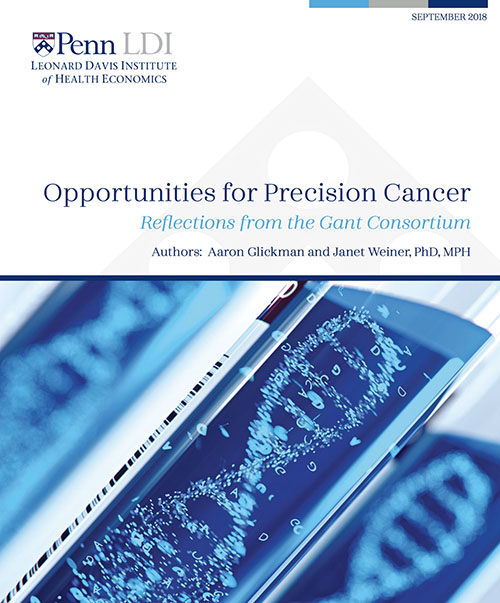Blog Post
Penn’s Gant Family Precision Medicine Consortium Takes On Sustainable Targeted Oncology
Challenges in precision medicine
Biomedical advances in genomics and oncology, combined with rising costs for targeted cancer therapies, challenge the way we currently deliver and pay for cancer care. To foster the economic sustainability of targeted therapies, the University of Pennsylvania convened the Gant Family Precision Cancer Medicine Consortium, a multidisciplinary work group of experts from health care economics, policy, law, regulation, biomedical research, patient advocacy, and the pharmaceutical and insurance industry. Co-chaired by LDI Senior Fellows Justin Bekelman and Steven Joffe, the committee met regularly in 2016-2017 to identify ways to promote economically viable targeted cancer therapies. Dr. Bekelman and Joffe recently published their own conclusions in a JAMA viewpoint, and a new LDI report synthesizes the consortium’s discussions.
Defining Targeted Cancer Therapy, and the Challenge of Cost
The report begins with a review of competing definitions of precision cancer medicine—a term that is often used with imprecision—to set the context for the Gant consortium’s work. For its purposes, the group defined precision, or more specifically, “targeted” cancer therapies as those that rely on diagnostic identification of targets within cancer cells and require genomic and related analyses.
Across its meetings, the Gant consortium sought to demystify cancer’s unique economic, social, and biomedical status. The report discusses some of the consortium’s conclusions about cancer’s special features: the substantial political and public attention cancer receives, funding carve-outs for research and care, and the possibly disproportionate spending on treatment. The consortium considered how targeted therapies may magnify or call in to question those unique features of cancer, with possible implications for patients, families, researchers, health systems, and providers.
Highlights From the Consortium
The LDI publication is a succinct summary of months of expert deliberation. It translates the occasionally technical discussions into a digestible environmental scan of both the challenges to targeted oncology and ways to improve the sustainability new cancer therapies. As a read out from the work group meetings, the report includes:
- A review of recent trends in cancer drug prices and spending, including a discussion of the drivers of increased spending–and implications for access, equity, and systemic costs.
- A comparative study of value frameworks–tools designed to methodically weigh the costs and benefits of new treatments–from the National Comprehensive Cancer Network, American Society of Clinical Oncology, and the Institute for Clinical and Economic Review.
- Case studies of managed entry agreements (MEAs) in Germany, the UK, and Canada. These regulatory levers are intended to provide access to novel drugs when clinical effectiveness evidence is limited or the potential budgetary impact is large.
- Targeted cancer’s potential to genetically “salami slice” cancer into dozens of rare, “orphan diseases.” Such reimagining of cancer carries implications related to the US Orphan Drugs Act and the peculiarities of the market for orphan drugs.
- An enumeration of emerging themes from the Gant consortium’s deliberations, including the growing justice and health equity concerns in cancer care, the need to develop patient-centered value frameworks, and possible international ripple effects of policy innovations.
Looking Ahead
In addition to the LDI report, Dr. Bekelman and Dr. Joffe published their own views in JAMA. They call for the U.S. Food and Drug Administration to transparently define clinically meaningful effect sizes, which would help define what benefits go beyond “marginal.” Additionally, they advocate for Medicare demonstration projects to test drug price negotiation. Finally, Bekelman and Joffe argue that professional guidelines should consider demarcating marginally effective and highly effective drugs, and when two or more regimens have comparable benefit/harms, those guidelines should favor the lower-priced option.
Taken together, the LDI report and JAMA viewpoint represent state-of-the-science thinking on how to create an economically sustainable system that takes advantage of the latest advances in targeted cancer care. The full report can be seen here.
